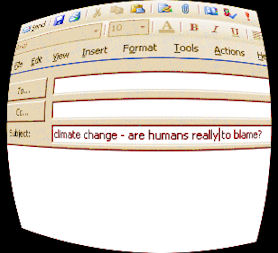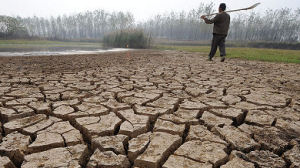Climategate: the emails behind a scientific storm
The Copenhagen summit took place under a cloud of sceptism after leaked emails appeared to show UK scientists exaggerating the threat of climate change.
Professor Phil Jones from the University of East Anglia’s climatic research unit faced allegations he had covered up flawed data on temperature rises.
The storm blew up when 13 years of emails were stolen from the university’s servers and posted online ahead of UN clmate talks in Copenhagen.
A message sent in 1999 by Prof Jones in 1999 referred to a “trick” to “hide” a decline in global temperatures.
A six-month inquiry cleared him of any wrongdoing but not before Jones had told Channel 4 News he had felt “tremendously pressurised” by the affair.
He said: “It makes me quite worried people are beginning to doubt the climate has warmed up.”
Peter Liss, who stood in for Jones during his suspension, told Channel 4 News: “I think there is no question that the global temperature record produced by the climatic research unit is absolutely correct and of course it is vindicated by two other institutions in the United States, who have looked at the data and processed it in their ways.”

Scientist at heart of climategate row cleared
A group of MPs criticised a “culture of non-disclosure” at the University of East Anglia (UEA), saying a reluctance to share data in response to Freedom of Information (FoI) requests was “reprehensible”.
The Climatic Research Unit (CRU) came under fire after hacked emails, which sceptics claimed showed scientists hiding and manipulating climate data, were leaked online.
Some of the leaked emails suggested a “blunt refusal” by the CRU’s head Professor Phil Jones to share scientific data, the Commons committee report concluded.
But Phil Willis, former MP and chair of the select committee, said the committee’s short inquiry had found no evidence that Professor Jones hid or manipulated data to back up his own science.
Much of the criticism of CRU by sceptics has focused on an email in which he talked about using a “trick” to “hide the decline” in temperature records sourced from tree ring data in the 1960s.
But the MPs said the phrases were colloquialisms and did not represent a systematic attempt to mislead.
The report found Prof Jones had no case to answer over allegations of dishonesty and his scientific reputation was intact – although one of the committee’s MPs, Graham Stringer, said the inquiry could have been more thorough on the issue.
The committee also said it sympathised with Prof Jones over his frustration at requests from sceptics asking for information “purely to undermine his research”.
But Mr Willis said: “In reality, that’s no excuse. If people want that information for whatever motive, provided it is a scientific motive, it’s important in terms of confidence to make that available.”
The report also said that Prof Jones’ actions in not releasing data and his methods for drawing conclusions were in line with those of other climate scientists – but that those practices needed to change.
The MPs said much of the responsibility for failing to disclose information in response to FoI requests lay with the University of East Anglia, rather than its small Climatic Research Unit.
Mr Willis said UEA should have challenged what was going on at CRU, “rather than work with them to deny these people information”.
The UEA said it welcomed the report from the committee, and accepted the need for greater transparency in climate science.
Analysis from Science Correspondent Julian Rush:
This report completely exonerates Professor Phil Jones and the Climatic Research Unit at UEA.
Though it had been obvious from early on, it is clear now that there was little or no substance in the claims of the tiny handful of climate sceptics, who have conducted a noisy campaign against Jones and his colleagues to further their aim of exaggerating doubts about climate science.
But it does point to failings within the University of East Anglia on how it handled Freedom of Information requests and to a common practice that had grown up among scientists of not publishing the raw data and computer codes in their academic papers - a practice which it says is entirely understandable but which the committee says should change, not least because the quality of the science must be seen to be irreproachable.
(Raw data is often difficult to handle; most climate scientists work from data sets derived from it that have been checked and shaped into a more useable form. Such data sets were in the public domain and the methods used to clean up the raw data were openly published too, contrary to the sceptics' claims).
It is clear too that there has been damage to the credibility of climate science. The university mishandled the crisis in the beginning and climate scientists were too slow to come out of their corner fighting, in part, perhaps, because they were weary of the incessant attacks by the sceptics.
In that sense, the sceptics have won a victory - of sorts - but it has been a bitter lesson for the science community. Two inquiries are ongoing - an internal one at the university and the police investigation into the original theft of the emails. In all the brouhaha, it's been easy to lose sight of the fact that a criminal act took place. Who did it, why, and on whose instruction is the real story here.

Climate sceptic received funding from industry
Science Correspondent Tom Clarke revealed in March 2010 that a prominent global warming sceptic at the centre of the climate emails scandal received payments from lobby groups which deny climate change.
In an email exchange with Channel 4 News, Stephen McIntyre, who runs the Climate Audit blog, admitted receiving fees and travel expenses for speaking at a conference organised by the Heartland Institute – an ultra-conservative free-market lobby group based in the US.
He also admitted being paid travel expenses to another conference run by similar organisations: the Competitive Enterprise Institute and the George Marshall Institute.
Mr McIntyre’s Climate Audit blog was one of the first sites to publish details of thousands of emails leaked from the University of East Anglia’s (UEA) Climatic Research Unit.
Many climate sceptics, including McIntyre, have previously avoided suggestions that they are supported by the fossil fuel industry or free-market think-tanks. Steven McIntyre maintains that neither he nor his website receives direct funding from industry or lobby groups sponsored by them.
However defenders of climate change argue that sceptics should be subject to the same scrutiny as the science establishment.
Bob Ward from the Grantham Institute said: “It is important that transparency applies to sceptics as well and that includes their sources of funding.
“Mr McIntyre’s admission shows he has been able to disseminate his views because he had financial support from lobby groups in the US. This doesn’t necessarily invalidate his views but it is important people are aware of his sources of support.”
At the Heartland conference entitled “Global Warming: was it ever really a crisis?” in February last year, Mr McIntyre presented his critique of the data supporting the controversial “Hockey Stick” graph.
The graph is the work of Professor Phil Jones at the University of East Anglia and other climate scientists. It shows that the last century is the warmest in the last 1000 years – a conclusion Mr McIntyre strongly disputes. It was emails relating to the Hockey Stick data that formed the bulk of the 1000 or so that were leaked from UEA.
The sums received by Mr McIntyre are small and he says he donated the $1000 honorarium received from the Heartland Institute to charity.
In one of the emails received by Channel 4 News he also defended the payments saying: “I’ve carried out research at very considerable personal financial opportunity cost, while my critics have had generous funding from public sector organisations,” Mr McIntrye told Channel 4 News.